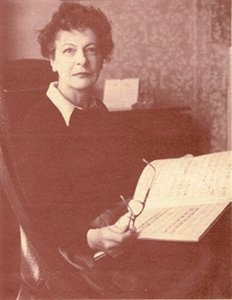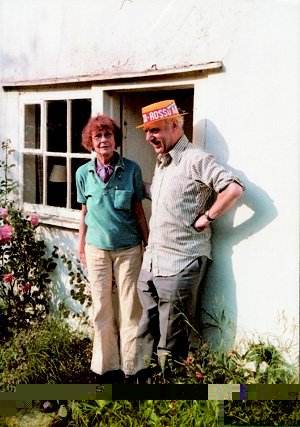
Born in Gerrards Cross, Buckinghamshire, Phyllis moved to London with her
parents after the First World War where she remembered seeing barrel organs
accompanied by brightly-dressed dogs and monkeys sitting patiently next to
their itinerant owners. Windows would open and coins cascade down wrapped
in coils of paper before the acts moved on down the road.
Her primary education was short but not sweet because she publicly but
inadvisedly recited a bawdy end-of-term poem she had been taught by her father.
The parents loved it but not the headmistress who promptly expelled her at
the tender age of 10! Her parents saw no need for further education for a
girl in the early-1920s so from thereon in she effectively educated herself.
Much to her mother's chagrin - who had hoped she would take to serious music,
she bought herself a ukulele for 10/6 and promptly learnt to play it before
graduating to composing fox-trots and blues to her own lyrics. Soon part
of a touring concert party she was fortunate enough to be spotted by a professor
during a performance they gave at the Conservatory of Music in Blackheath.
He promptly offered to give her lessons in 'proper' music which led eventually
to serious composition in London at the Royal Academy from 1928-1932, primarily
under the guidance of Harry Farjeon. In 1964 they elected her a Fellow (F.R.A.M.)
'I cannot admit to being an illustrious pupil. I learnt the timpani and was
playing at a concert (Royalty present) when I descended with a wallop a bar
before the crucial moment … 'You may be only 17 but do that again and
you're fired!' said the conductor. I next had a shot at writing a symphony
in which every instrument played non-stop without a break. As the duration
was nearly an hour the players all emerged breathless and puce in the face.'
Violin and piano sonatas followed together with what Phyllis thought was
an undeserved Gold Medal. That her works had promise, however, there is no
doubt as the following amusing incident relates. Female composers were few
and far between at the time and the doyen of them all was the redoubtable
Dame Ethel Smyth who invited Phyllis to lunch at her home in Woking.
Unfortunately, Phyllis's male chaperone insisted on stopping off at various
pubs en route and they pulled in hopelessly late.
'When we did eventually arrive, pretty well-oiled, there was Dame Ethel,
dressed - with the exception of a harsh tweed skirt - in an entirely male
rigout - stiff collar, tie, sports coat, billy-cock hat, and clutching a
struggling sheep dog. Her eyes were ablaze with anger as she shouted 'Lunch
is ruined, how like a man.' Once the meal was over her attitude lightened
somewhat and after I strummed my Cello Concerto ff for her
she said 'At last I have heard a real woman composer!' Unfortunately
the poor dear was virtually tone deaf so I did not take the vociferous praise
too literally. She then sang and played Wagner for hours after which we finally
took our departure, completely exhausted. But the ordeal was not quite over.
Her house was near a kind of roundabout from which we seemed quite unable
to extricate ourselves and kept going round in circles, each time returning
to the same spot to see her still glowering from the window. At length she
burst open the door and yelled 'GO!' Terrified, we managed to find a side
turning and scarpered. My Cello Concerto was performed soon afterwards
at Bournemouth with Dame Ethel sitting in the front row banging her umbrella
to what she thought was the rhythm of the music. Just before she died, I
invited her to my wedding. Her reply was typical and the card read '1,000
congratulations; sorry, too old to come but promise my ghost will not appear.'
In 1935 Phyllis married Alan Frank when her pessimistic professor thought
she would stop writing, but he was wrong. Despite destroying many manuscripts
- which is why her works have no opus numbers - she produced a rich legacy
of music which is sadly, like so much good British music, now rather neglected.
Like many composers, she feared her works were not as good as they should
be but was realistic enough to pen the following thoughts in 1979, while
recovering from an operation: 'I must admit to having a sneaking hope that
some of my creations may prove to be better than they appear. One can only
surmise and it's not for the composer to judge. All I can vouch is this:
writing music can be hell; torture in the extreme; but there's
one thing worse; and that is not writing it.'
One of the author's favourite pieces is the delightful four-movement suite
London Fields, commissioned for the BBC Light Music Festival in 1958.
With the help of a privately recorded performance he used it to introduce
a class of inner-urban academically limited boys to music more serious than
the contemporary pop to which they were accustomed. As each of the movements
unfolded, so the children were invited to sketch what came into their minds.
Springtime at Kew evoked daffodils and crocuses; The Maze at Hampton
Court produced all kinds of curly-wurly shapes; St. James Park - a
Lakeside Reverie resulted in ducks and swans swimming a-plenty while
the grand finale, Hampstead Heath - Rondo for Roundabouts brought
forth all manner of helter-skelters, dodgem cars, candy floss, toffee apples
and the like. The icing on the cake came after the fourth week when a small
boy approached the teacher at the end of the lesson and said 'Please sir,
I like this music. Can you do a recording for me?' He got his recording and
for all I know he is, like me, still playing it.
Although not a committee woman by nature, Phyllis Tate served from 1976-1981
on the Management of the Performing Rights Society's Member Fund - the first
lady to be so appointed. Also a member of the Composers' Guild from 1959,
she served on its Executive Committee in 1971. One of the outstanding British
composers of her generation, she was truly her own person whose independent
creative qualities produced a wide range of music which defy categorisation.
For that reason alone, it is to be hoped she will, in due course, receive
proper recognition by the authorities.
Notes by Edmund Whitehouse - Assistant Editor, This England magazine

LIST OF PUBLISHED WORKS BY PHYLLIS TATE
Saxophone Concerto 1944
Nocturne for Four Voices 1946
Six Songs for Children 1946
Sonata for clarinet & cello 1947
String Quartet 1952, revised 1982 as Movements for String Quartet
Choral Scene from The Bacchae 1953
The Lady of Shalott for tenor & instruments 1956
Air and Variations for violin, clarinet & piano 1958
London Fields (Kew Gardens, Hampton Court Maze, St. James' Park,
Hampstead Heath) 1958
Witches and Spells choral suite 1959
The Lodger opera 1960
Dark Pilgrimage television opera 1963
A Victorian Garland for two voices & instruments 1965
Gravestones for Cleo Laine 1966
Seven Lincolnshire Folk Songs for chorus & instruments 1966
A Secular Requiem for chorus & orchestra 1967
Christmas Ale for soloist, chorus & orchestra 1967
Apparitions for tenor & instruments 1968
Coastal Ballads for baritone & instruments 1969
Illustrations for brass band 1969
To Words by Joseph Beaumont for women's chorus 1970
Variegations for solo viola 1970
Serenade to Christmas for mezzo-soprano, chorus & orchestra 1972
Lyric Suite for piano duet 1973
Exploitations around a Troubadour Song for piano solo 1973
Creatures Great and Small for mezzo-soprano, guitar, double bass &
percussion 1973
Two Ballads for mezzo-soprano & guitar 1974
The Rainbow and the Cuckoo for oboe, violin, viola & cello 1974
Sonatina Pastorale for harmonica & harpsichord 1974
Songs of Sundrie Kindes for tenor & lute 1975
St. Martha and the Dragon for narrator, soloists, chorus & orchestra
1976
Scenes from Kipling for baritone & piano 1976
A Seasonal Sequence for viola & piano 1977
Panorama for strings 1977
All the World's a Stage for chorus & orchestra 1978
Compassion (words by Ursula Vaughan Williams) to mark the 150th
Anniversary
of the Royal Free Hospital 1978
Scenes from Tyneside for mezzo-soprano, clarinet & piano 1978
Compassion for chorus & organ (or orchestra) 1978
Three Pieces for solo clarinet 1979
The Ballad of Reading Gaol for baritone, organ & cello 1980
Prelude-Aria-Interlude-Finale for clarinet & piano 1981
Many small choral pieces, songs and works for young people, including:
Street Sounds, The Story of Lieutenant Cockatoo, Twice in a Blue Moon,
A Pride of Lions, Scarecrow, Solar.

